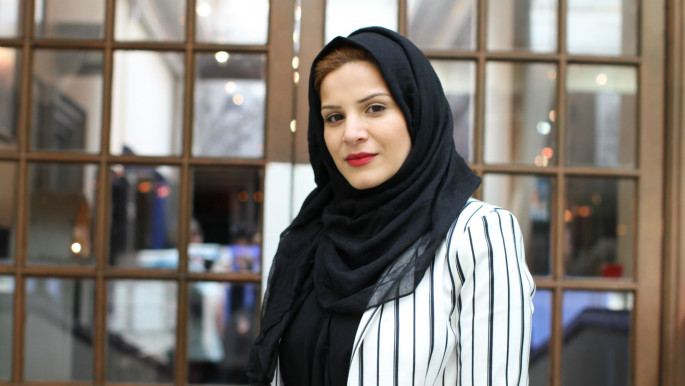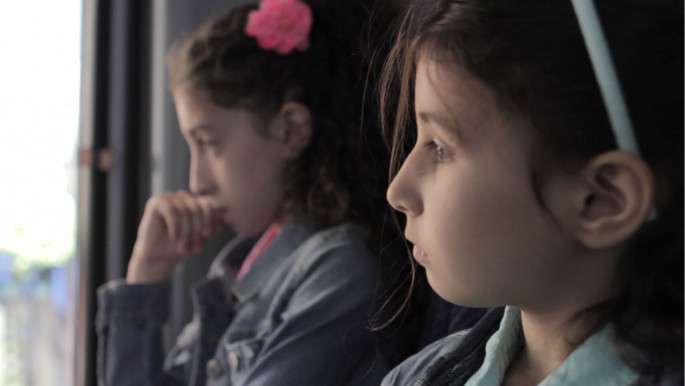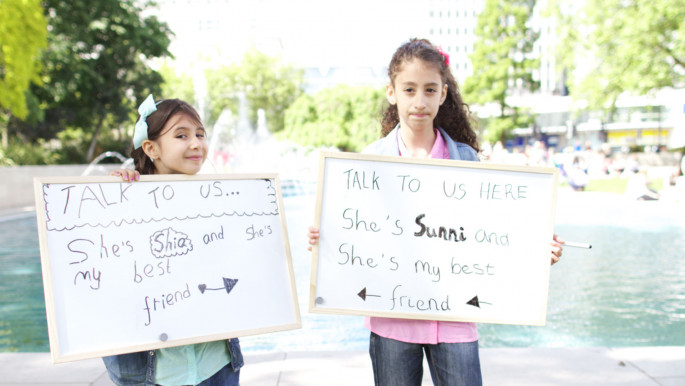Why can't I be a Sushi?
It reveals their journey as they seek answers to why and how the historic decisions of the past appear to have created a growing number of "extreme" Muslims whose hallmark is intolerance.
The documentary had its premiere last month at the Tricycle theatre in London to a packed audience, with the full attendance of the film crew and cast.
Elsoudani is a British Iraqi documentary film maker, humanitarian, cinematographer and creative director of Spoken Iris Films - a production company that aims to create content that tackles social and political issues, highlight injustices, uncover realities, encourage consciousness and promote peace.
Fitting in a man's world
An industry dominated by men may be considered a daunting prospect for a woman to break in to, but Elsoudani says industry figures were very supportive and encouraging of her work - "even more so because there aren't many British Iraqi female directors around".
But it was not gender that proved the toughest obstacle to overcome - many may relate, she says to the "difficulty of fitting in the mainstream media and getting our voices heard as an ethnic minority".
 |
|
She seeks to continue her journey of filmmaking to open doors for more female directors from different ethnic backgrounds.
'Just a Muslim'
The idea of this documentary began to germinate back when Elsoudani was still a student during college and university years. She felt constantly asked or pushed into a sect but she openly labelled herself as "just a Muslim".
"I personally have seen a lot of discrimination and misjudgement towards followers of the opposite sect. Shias would speak badly of Sunnis and Sunnis would speak badly of Shias and all the misconceptions would be flying everywhere passed from one person to another as if there were inerasable facts."
The pattern followed her into the workplace.
In one institute, Elsoudani felt she was isolated because she simply refused to belong to any sectarian group.
"It's very disappointing that, as Muslims, we hold such forceful, judgmental mentalities and that we have forgotten the countless similarities we have in common with one another."
Elsoudani believes humanity comes first: "To treat each other with mutual respect, believe what we want to believe and leave the judgement to God."
Describing herself as a "SuShi" - in the sense that she takes a little from both Sunni and Shia sects - Elsoudani explains that the film reflects her personal experience.
 |
|
The first question strangers would ask was whether she were Sunni or Shia - and responding merely "I'm just a Muslim" in't always enough.
"That really bothered me," said Elsoudani.
There are many misconceptions about both sects that need to be addressed, she said.
"People needed to be reminded to go back to their roots and embrace the simplicity of just being a Muslim regardless of which sect one follows," she told The New Arab.
The sectarian conflict in Iraq had a huge impact on Elsoudani's work. We have all watched the news, "where you hear about a suicide bomber who has just killed X number of souls targeting a particular sect and you're left with a bitter, anger feeling - where you wish you could do something to help but you feel immensely helpless".
She directed her anger and frustration into the energy for a film to enlighten viewers, especially younger moviegoers.
She recalls how, many years ago in Iraq, people from different faith groups and sects lived very peacefully together. They would marry into the same families - and Elsoudani wanted to bring back that identity of tolerance and community.
Two sides to a story
"People may have an opinion that the film is painting a romanticised picture of Sunnis and Shias uniting but I would say if it existed once, then it can exist again - just like we are able to live with other people of a different faith group."
She believes strongly that we can "be less arrogant and more accepting of the other sect, and that's why in one scene in the film I decided to interview a Sunni-Shia couple".
Ensuring that the film was approached in a balanced way was a top priority for Elsoudani, although she admits it was tricky at times. "I would often question whether I was representing each sect fairly."
The last thing she wanted to do is "add more fuel to the fire especially because it's such a sensitive subject, so I kept it 90 percent scripted and mainly focused on what concerns each sect has towards the other. Whether I achieved my goal or not - I would leave that for others to judge."
 |
|
Elsoudani's aim was to interview as many diversely opinionated people as possible, because she wanted to keep the film "realistic, rich in content and welcoming to different kinds of people".
Understandably, she believes some had a "fear of being misrepresented in the documentary, as it's difficult to trust everyone's journalism in our modern times".
"I [don't think I] particularly 100 percent succeeded in representing a variety of opinions."
Questioning the violence, not theology
In Why Can't I be a Sushi? there are pointers towards the religious differences, especially when Sheikh Bahmanpour was talking - but Elsoudani says the point of the film is not to ask why there are differences of opinion, but rather why these differences have led to violence and animosity.
"To me, the conflict seems to be more political than religious although it may be hiding behind the religious language."
The main focus and intention of the project is to objectively address as many key sectarian misconspetions as possible, "so that some kind of bridge can be built between the two sects once they realise that they have so much in common".
During Elsoudani's research "it was clear that there were many more misconceptions about Shia practices in general in comparison with the Sunni sect when judging the actual Shia doctrine itself regardless of how people are practicing it".
 |
By using two young girls for such a complex film Elsoudani wanted to take people back to their roots, reminding them of the simplicity of the religion of Islam. |  |
"Shias are also the minority who are mostly being targeted and killed - so, naturally, one may argue that it's only fair to put a lot of emphasis on this issue."
She has tried to ensure balance by addressing the "unacceptable cultural practices" that some Shias perform. "There is a Shia group, for example, that beat themselves in the month of Muharram as well as the issue of 'cursing' which was very clear in the documentary."
By using two young girls for such a complex film Elsoudani wanted to take people back to their roots, reminding them of the simplicity of the religion of Islam.
She felt that if she addressed such a complex and sensitive issue so "simply, through the eyes of two innocent-yet-mature children, that would somehow have a great impact in influencing mindsets, because it connects us to the child within and makes us reflect on our actions, behaviours and thought patterns more than if it was a documentary presented by adults".
Elsoudani describes the reaction received from the premiere's diversely mixed audience as "phenomenal".
The Tricycle was packed with documentary fans hungry for such a film.
 |
|
The love of tapping into identity issues or cross-cultural issues or something that enlivens the conscience and promotes peace pushes Elsoudani to persevere.
"I mostly love addressing unspoken social or political subjects that we tend to shy away from. And that's why I recently established my own production company, which I called Spoken Iris Films."
Hoda Elsoudani is currently working on a short video in support of the refugee crisis.





 Follow the Middle East's top stories in English at The New Arab on Google News
Follow the Middle East's top stories in English at The New Arab on Google News


